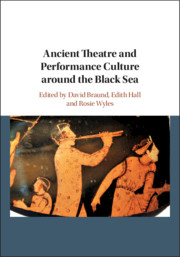Book contents
- Ancient Theatre and Performance Culture around the Black Sea
- Frontispiece
- Ancient Theatre and Performance Culture around the Black Sea
- Copyright page
- Contents
- Figures
- Notes on Contributors
- Preface
- Abbreviations
- Map
- Part I Approaches
- Part II Places
- Part III Plays
- 11 Space, Place and the Metallurgical Imagination of the Prometheus Trilogy
- 12 Fragmentary Greek Tragedies Set in the Black Sea
- 13 Black Sea Back Story: Euripides’ Medea
- 14 Dare to Believe: Wonder, Trust and the Limitations of Human Cognition in Euripides’ Iphigenia in Tauris
- 15 Visualising Euripides’ Tauric Temple of the Maiden Goddess
- Part IV Performative Presences
- Epilogue: Dancing around the Black Sea: Xenophon, Pseudo-Scymnus and Lucian’s Bacchants
- References
- Black Sea Index
13 - Black Sea Back Story: Euripides’ Medea
from Part III - Plays
Published online by Cambridge University Press: 12 November 2019
- Ancient Theatre and Performance Culture around the Black Sea
- Frontispiece
- Ancient Theatre and Performance Culture around the Black Sea
- Copyright page
- Contents
- Figures
- Notes on Contributors
- Preface
- Abbreviations
- Map
- Part I Approaches
- Part II Places
- Part III Plays
- 11 Space, Place and the Metallurgical Imagination of the Prometheus Trilogy
- 12 Fragmentary Greek Tragedies Set in the Black Sea
- 13 Black Sea Back Story: Euripides’ Medea
- 14 Dare to Believe: Wonder, Trust and the Limitations of Human Cognition in Euripides’ Iphigenia in Tauris
- 15 Visualising Euripides’ Tauric Temple of the Maiden Goddess
- Part IV Performative Presences
- Epilogue: Dancing around the Black Sea: Xenophon, Pseudo-Scymnus and Lucian’s Bacchants
- References
- Black Sea Index
Summary
‘You need powers of divination if you arrive amongst new customs and laws you have not been taught at home in order to deal best with your husband’, says Medea to a group of indigenous Corinthian wives with no equivalent problem (Medea 238–40). Unlike them, she is ‘alone, stateless and abused by a husband’ after being ‘carried off as plunder’ from a ‘barbarian’ land (255–6). Her mistake, she now knows, was to leave her father’s house in Colchis, ‘persuaded by the words of a Greek’ (801–2). Jason reminds her that she is from what he perceives to be the wrong side of the frontier he believes separates Greeks from barbarian, and that she should be grateful that she now lives in a land where justice and the rule of law prevail (536–8). Once his children are dead, he can only assume that when he brought her ‘to Greece from a barbarian homeland’ he had not been of sound mind (1329–31), for ‘no Greek woman’ would have been capable of filicide (1339–40). The conceptual and rhetorical polarisation of Greek and barbarian – validated and ironically subverted by turns – is a fundamental structuring principle of this mixed-race marriage and indeed of the entirety of the tragedy, as of several others by this author. But there is little equivalent to the vivid ethnographic colour which tinges earlier tragedies involving non-Greeks, Aeschylus’ Persians and Suppliants in particular, through vocabulary, vowel sounds, political attitudes, discussion of physical appearance, customs, gait, gestures and indicated costumes. Medea is from Colchis on the River Phasis which flows into the far eastern corner of the Black Sea. But in what sense, if any, is she identifiably Colchian?
- Type
- Chapter
- Information
- Ancient Theatre and Performance Culture Around the Black Sea , pp. 267 - 288Publisher: Cambridge University PressPrint publication year: 2019
- 1
- Cited by



